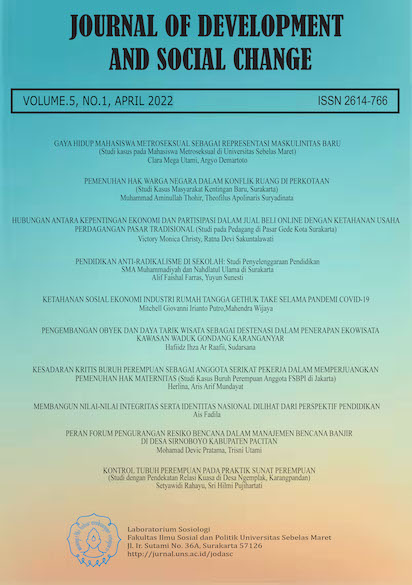Efektivitas Program Keluarga Harapan Dalam Pengentasan Kemiskinan Di Kelurahan Sondakan
Abstract
Poverty is a complex issue that requires sustainable handling strategies. The government has implemented the Conditional Cash Transfer program known as the Family Hope Program (PKH) to alleviate poverty by improving the quality of life of poor communities through better access to education, health, and social welfare services. This study aims to assess the effectiveness of PKH in reducing poverty in Sondakan Subdistrict, using four main indicators: target accuracy, program objectives, program socialization, and program monitoring. This research employs a qualitative method with a phenomenological approach. Data were collected through interviews, observations, and documentation. Robert K. Merton’s Functionalism structural theory is used to analyze the interrelation of elements within the social system, highlighting the function of each component in supporting the sustainability of PKH.
The results show that the program is effective in terms of socialization, but less effective in target accuracy, goal achievement, and monitoring. Identified obstacles include dependency among beneficiaries, as well as administrative and system-related issues. The evaluation of these obstacles suggests the need for beneficiary education, administrative and system improvements, and enhanced support from program facilitators. The government also strives to improve program effectiveness through not only material support but also moral encouragement, graduation programs, and skills training to promote economic independence.
Full Text:
PDFReferences
Budiani, N. W. (2007). Efektivitas program penanggulangan pengangguran karang taruna “eka taruna bhakti” desa sumerta kelod kecamatan denpasar timur kota denpasar. Jurnal ekonomi dan Sosial, 2(1), 49-57.
Bogdan, Robert C. and Taylors K.B. (1992). Qualitative Researtch for Education an Introduc to Theory and Metdods Bosten: Ally and Bacon Inc.
Dunn, W. N. (2003). Public Policy Analysis: An Introduction. Prentice Hall.
Hartanto, A. A. E. (2019). Efektivitas Program Keluarga Harapan (PKH) dalam mengentaskan kemiskinan di Kecamatan Trucuk Kabupaten Klaten.
Helmi, M. (2023). Pemanfaatan Dana Bantuan Program Keluarga Harapan (PKH) untuk Usaha Produktif (Studi Kasus Keluarga Penerima Manfaat di Kecamatan Jerowaru, Kabupaten Lombok Timur).
Kementerian Sosial RI. (2016). Pedoman Pelaksanaan Program Keluarga Harapan (PKH). Jakarta: Kementerian Sosial RI.
Kementerian Sosial Republik Indonesia. (2018). Peraturan Menteri Sosial Republik Indonesia Nomor 1 Tahun 2018 tentang Program Keluarga Harapan. Jakarta: Kementerian Sosial RI.
Kementerian Sosial RI. (2023). Pedoman Pelaksanaan Program Keluarga Harapan (PKH). Jakarta: Kementerian Sosial RI.Dunn, W. N. (2003). Public Policy Analysis: An Introduction. Prentice Hall.
Kumala, S. A. (2024). EFEKTIVITAS PELAKSANAAN PKH DALAM KOMPONEN KESEJAHTERAAN SOSIAL (KELOMPOK LANJUT
USIA DAN DISABILITAS BERAT). Jurnal Kalacakra: Ilmu Sosial dan Pendidikan, 5(1), 40-55.
Merton, R.K. (1968). Social theory and social structure. Free Press.
Nurwani, T. W., & Hasani, H. (2020). Keberhasilan PKHDitinjau Dalam Kaitannya Dengan Keterampilan Pendamping Dan Partisipasi KPM: Studi Di Sijunjung Sumatera Barat. Sosio Konsepsia, 10 No. 1, 1-13.
Pratama, R. A., Broto, M. F., & Persada, R. (2022). IMPLEMENTASI PROGRAM KELUARGA HARAPAN (PKH) DI KECAMATAN BUNGURAN
TIMUR KABUPATEN NATUNA. Journal of Syntax Literate, 7(6).
Prichatin, A. (2019). Efektivitas Program Keluarga Harapan (Pkh) Dalam Upaya Meningkatkan Kesejahteraan Keluarga (Studi Kasus Pada PKH Desa Kasegeran Kecamatan Cilongok Kabupaten Banyumas) (Doctoral dissertation, IAIN Purwokerto).
Putri, B. R. (2023). Analisis Peran Program Keluarga Harapan Terhadap Akses Kesehatan Dan Pendidikkan Pada Keluarga Penerima Manfaat. Jurnal Niara, 15(3), 468-475.
Rahmadila (2023). Pkh, k. H. Peran pendamping sosial kota lhokseumawe dalam graduasi keluarga penerima manfaat (kpm) program.
Rohaeni, N. E., & Saryono, O. (2018). Implementasi Kebijakan Program Indonesia Pinta (PIP) Melalui Kartu Indonesia Pintar (KIP) dalam Upaya Pemerataan Pendidikan. Indonesian Journal of Education Management and Administration Review. Vol. 2 (1).
Rohman, A. (2009). Memahami pendidikan & ilmu pendidikan. ed.1., cet.1. Yogyakarta : LaksBang Mediatama bekerja sama dengan Kantor Advokat" Hufron & Hans Simaela".
Sajidin, A. (2024). Efektivitas Program Keluarga Harapan (PKH) sebagai upaya mengentaskan kemiskinan di Kelurahan Situsaeur Kecamatan Bojongloa Kidul Kota Bandung.
Sutjiatmi, S., & Umaroh, F. (2019). Efektivitas Program Keluarga Harapan (Pkh) Dalam Meningkatkan Kesejahteraan Masyarakat Di Desa Kupu Kecamatan Dukuhturi Kabupaten Tegal. Indonesian Governance Journal Vol 2 No 2, 1-8.
Suharto, E. (2019). Strategi dan Kebijakan Pembangunan Sosial di Indonesia. Bandung: Alfabeta.
Sugiyono. (2018). Metode Penelitian Kuantitatif. Bandung: Alfabeta.
Sugiarto, E. (2023). Efektivitas Program Keluarga Harapan (PKH) dalam Pengentasan Kemiskinan di Kecamatan Bulakamba Kabupaten Brebes.
Suparno, S. (2018). Analisis Pemberian Bantuan Sosial Program Keluarga Harapan Terhadap Prestasi Belajar Anak Di Kecamatan Sepauk. JURNAL PEKAN: Jurnal Pendidikan Kewarganegaraan, 3(2), 177-185.
Todaro, M.P. and Smith, S.C. (2006) Economic Development, gh edition, England: Pearson Education Limited.
Ulina, S., Ginting, B., & Putri, M. (2022). Implementasi Pendataan Penerima Program Keluarga Harapan (Studi Kasus di Desa Suka Makmur). SABANA: Jurnal Sosiologi, Antropologi, dan Budaya Nusantara, 1(2), 94-105.
Widjajanti, R. (2019). Strategi Penanggulangan Kemiskinan Berbasis Conditional Cash Transfer (CCT). Yogyakarta: Gadjah Mada University Press.
Yolanita, R., & Yuniningsih, T. (2020). Efektivitas Program Keluarga Harapan di Kecamatan Gayamsari Kota Semarang. Skripsi, Fakultas Ilmu Sosial dan Ilmu Politik, Universitas Diponegoro.
Zannah, R. N. (2023). Efektivitas Program Keluarga Harapan dalam Upaya Penanggulangan Kemiskinan Pasca Pandemi Covid-19 (Studi Kasus Kabupaten Purbalingga). Skripsi, Universitas Muhammadiyah Yogyakarta.
DOI: https://doi.org/10.20961/jodasc.v8i1.101229
Refbacks
- There are currently no refbacks.

This work is licensed under a Creative Commons Attribution-ShareAlike 4.0 International License.




